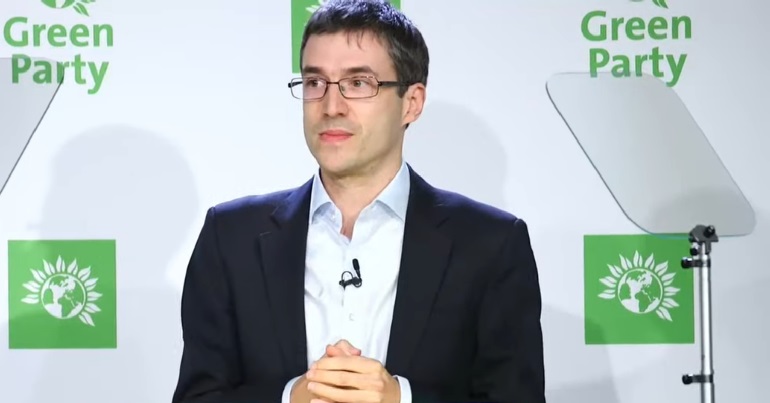What does Keir Starmer’s leadership mean for the Greens?

There’s been a fairly mixed reaction to Keir Starmer’s recent election as leader of the Labour Party – pro-European Labour supporters are relieved to finally have a leader who’s one of their own. The socialist wing of the Labour Party are reportedly feeling ‘politically homeless’ as they predict the party’s impending shift back to the centre. Now, perhaps more than ever, it’s important we try to find the positives in life so I’m going to explain why I think Starmer’s election is great news for Greens.
Clarity. Nothing is much more important in day-to-day life than clarity as I’m sure a lot of us have come to appreciate as we’re stuck inside, not knowing when we’ll next be able to go to the pub, see loved ones or even if we’ve still got a job. So, if nothing else, Starmer’s election provides clarity with regards to Labour’s direction and position on the UK political spectrum.
Labour under Jeremy Corbyn was, despite his clear socialist values, fairly wishy-washy in its position on a lot of things. This was probably partly to do with internal resistance from the centre and right-leaning figures within the party itself and of course wasn’t helped by the perpetual onslaught of hostility from the UK’s corrupt right-wing press. Under Starmer however, it seems clear that Labour will move back towards the centre-ground and, while that may not sit well with the left of the party, what is most important is that voters have no doubt about what they will be getting if they vote Labour.
Party’s positions shift over time and it’s important to keep on top of these changes in the political landscape. The way I see, the Tories are now encroaching on far-right territory previously occupied by the likes of UKIP with their hostility towards immigrants and ‘low-skilled workers’, and pursuit of a damaging Brexit at all costs following the ejection of almost all moderate members of the parliamentary party. The Liberal Democrats’ 2019 manifesto indicated their continuing ambivalence towards the free market and apparent unwillingness to make amends for their catastrophic decision on tuition fees while in coalition with the Tories which puts them around the centre-right. Labour will now move towards the centre with a fairly drastic change in policies imminent under Starmer’s leadership.
This leaves the Green Party as the only true party of the left fighting for genuine social and environmental justice and an egalitarian society. This clarity of position, I believe, will make voters’ decisions far easier when deciding which party to vote for or even join. Now, as many fellow Greens have already pointed out, the Green Party isn’t a platform for disgruntled Corbynites to bash capitalism from until Labour moves back to the left. People dedicated to socialism in the Labour Party should stay there and fight to keep it alive. However, for people looking to join or support a movement whose aims are unequivocally to improve society for every single person and tackle the climate crisis properly, regardless of whether or not they were previously a member of another party, the choice is clear.
As well as all that, we have to be frank and accept that without electoral reform and abolition of our ancient first past the post electoral system, the Greens are seriously disadvantaged electorally. Our best chance of that happening is with a progressive Labour government. A majority of Labour members support electoral reform, as do an increasing number of MPs and trade unions. Starmer has been more positive about reform than any other Labour leader during his campaign, so a priority now must be to further encourage the party’s shift towards reform. But for this to come to fruition Labour would need to be in government, or at the very least a coalition with other reform-supporting progressive parties. And like him or not, Starmer is electable. He’s the kind of politician that my relatively centrist mum, and millions of other disillusioned ‘traditional Labour voters’ like her, would vote for in a heartbeat. So while we might not align entirely with his position on a lot of issues, his success could prove fruitful for us in the long run.
One area where I think Starmer will be lacking is in his ability to engage and mobilise young people. Corbyn did this brilliantly with his radical ideas and willingness to engage with cultural institutions, most famously Glastonbury Festival! Starmer’s inability to replicate this provides Greens with a great opportunity to boost our support amongst young people. With strong, popular figures such as Caroline Lucas and Magid Magid, we can demonstrate to young people that there is a genuinely exciting and hopeful alternative to the stuffy, traditional politics that everyone sees at the moment. We can build on the wave of youth and student engagement in politics that Corbyn started and further expand and diversify our movement.
So while Starmer’s election may – on the face of it – seem like a blow for the left I think there are many positives to be found on closer inspection. For the time being we all need to pull together to beat coronavirus, regardless of our political affiliations and opinions. But when we emerge from the pandemic, whenever that may be, I believe we will be in a very strong position to move ever closer towards the kind of fair, prosperous society we want to see.
PS. Bright Green has big plans for the future, but we need your input. Take 2 minutes to see what we’re planning and tell us your thoughts.




Perhaps we need to have some clarity from the Green Party as well after the flirtation with the Lib Dems and what appears to be a move towards the centre. There are plenty of socialist (Eco-socialists) in the Green Party who were not seduced by Corbyn although respecting much of what he stood for.
The forthcoming Green Party leadership elections, rather than becoming a routine coronation, could provide a platform for a wide ranging debate about the party’s place in the political spectrum and its future direction.
Interesting points Martin. Parties are always shifting around the political spectrum so it can be difficult to nail them down to one position. The leadership elections will be interesting indeed!
I agree with Martin’s comment.Starmer may well move the Labour Party back to the ” centre ” or even ” right” as some people think, but he is at least electable and could therefore beat the Tories. But Labour has lost 25% of its traditional working class voters and with a new leader who is a Remainer, in addition to the pending boundary changes, there is a very good chance that it will fail to get an overall majority of MPs to form a government. And this is where we must do all we can to support Labour MPs such as Clive Lewis and the Labour Campaign for Electoral Reform calling for PR to be on the next election manifesto. That is precisely what a cross-party group called “Get PR Done!has been campaigning for since January 2020, covering 12 of the leadership hustings in the NE and NW.